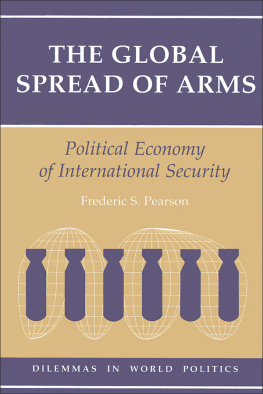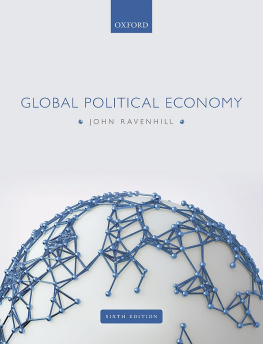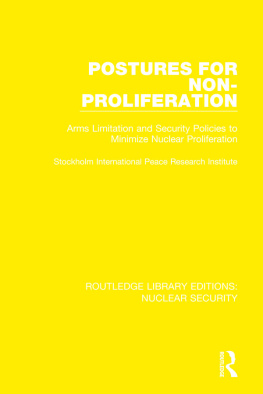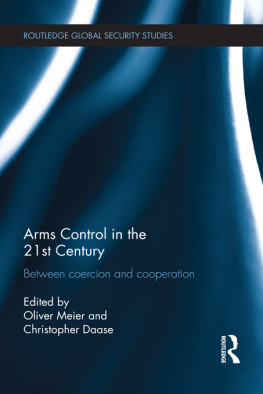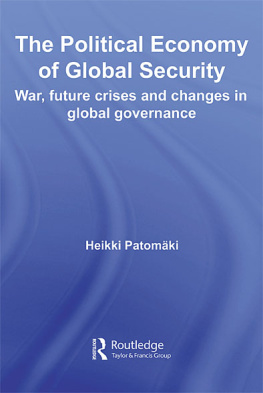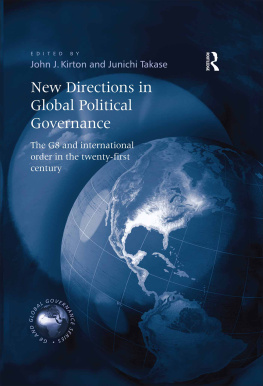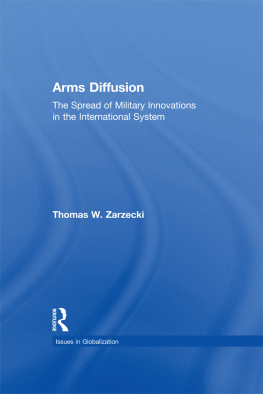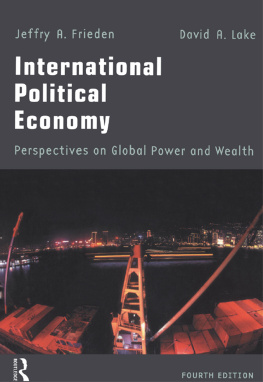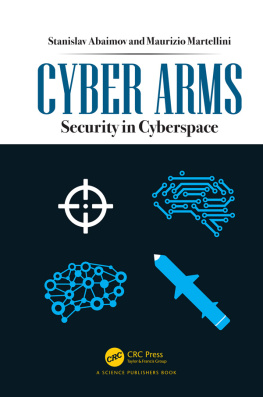The Global Spread
of Arms
DILEMMAS IN WORLD POLITICS
Series Editor
George A. Lopez, University of Notre Dame
Dilemmas in World Politics offers teachers and students of international relations a series of quality books on critical issues, trends, and regions in international politics. Each text examines a real world dilemma and is structured to cover the historicaL theoreticaL practicaL and projected dimensions of its subject.
EDITORIAL BOARD
FORTHCOMING TITLES
Ted Robert Gurr and Barbara Harff
Ethnic Conflict in World Politics
Deborah J. Gerner
One Land, Two Peoples:
The Conflict over Palestine
Gareth Porter and Janet Welsh Brown
Global Environmental Politics
Bruce E. Moon
International Trade in the 1990s
Karen Mingst and Margaret P. Karns
The United Nations in the Post-Cold War Era
For Beverly, Robert, and Rhonda
Eyes open to the world
Dilemmas in World Politics
First published 1994 by Westview Press
Published 2018 by Routledge
711 Third Avenue, New York, NY 10017, USA
2 Park Square, Milton Park, Abingdon, Oxon OX14 4RN
Routledge is an imprint of the Taylor & Francis Group, an informa business
Copyright 1994 Taylor & Francis
All rights reserved. No part of this book may be reprinted or reproduced or utilised in any form or by any electronic, mechanical, or other means, now known or hereafter invented, including photocopying and recording, or in any information storage or retrieval system, without permission in writing from the publishers.
Notice:
Product or corporate names may be trademarks or registered trademarks, and are used only for identification and explanation without intent to infringe.
Library of Congress Cataloging-in-Publication Data
Pearson, Frederic S.
The global spread of arms : political economy of international
security / Frederic S. Pearson.
p. cm. (Dilemmas in world politics)
Includes bibliographical references and index.
ISBN 0-8133-1573-5. ISBN 0-8133-1574-3 (pbk.)
1. Arms race. 2. Arms transfers. 3. Defense industriesSocial
aspects. 4. Security, International. I. Title. II. Series.
UA10.P43 1994
327.174dc20
94-8108
CIP
ISBN 13: 978-0-8133-1574-4 (pbk)
I wish to thank my colleagues on the Westview Dilemmas series editorial board for their constructive advice, George Lopez for excellent feedback on ideas and resources, and especially Jennifer Knerr for her stalwart guidance and calm encouragement.
Special gratitude goes to my wife, Melvadean, who provided wise counsel and a crash computer graphics course to make this readable.
Frederic S. Pearson
ASAT antisatellite
BAe British Aerospace Corporation
CAT Conventional Arms Transfer
CFE Conventional Forces in Europe
CIA Central Intelligence Agency
CIS Commonwealth of Independent States
CWC Chemical Weapons Convention
EC European Community
FARC Revolutionary Armed Forces of Colombia
FRG Federal Republic of Germany
FSU former Soviet Union
GNP gross national product
GRIT graduated and reciprocated initiative in tension-reduction
IAEA International Atomic Energy Agency
IGO intergovernmental organization
IISS International Institute for Strategic Studies
IRA Irish Republican Army
KGB State Security Agency
LDC less developed country
MAD mutual assured destruction
MIRV multiple independently targeted reentry vehicle
MTCR Missile Technology Control Regime
NATO North Atlantic Treaty Organization
NIC newly industrializing country
NPT Nuclear Non-proliferation Treaty
OAS Organization of American States
OAU Organization of African Unity
OECD Organization for Economic Cooperation and Development
PLO Palestine Liberation Organization
SALT Strategic Arms Limitation Talks
SIPRI Stockholm International Peace Research Institute
SOPS standard operating procedures
START Strategic Arms Reduction Treaty
TTBT Threshold Test Ban Treaty
The end of the cold war between the United States and the USSR seemed to usher in a moment of opportunity for peace in 1990. Major power leaders in Washington and European capitals even began speaking about the creation of global institutions to keep the peace and establish a new order, including controls on the spread of armament. Indeed, major powers in world politics share certain interests in controlling events in various regions and preventing unwanted developments and actions. When weapons become widely available to many governments and political groups (such as terrorists), attaining such control or order (often referred to as stability) is more difficult.
Although the cold wars end seemed to offer hope of a peace dividend in limiting arms supplies and saving the cost of their production or purchase, it has since become clear that stemming the tide of global arms distribution is far more problematic than many suspected and that the major powers themselves continue to play the pivotal role of weapons distributors. Despite arms control intentions (i.e., desires to limit the number or types of weapons in countries arsenals or available in international trade), local wars continue to boil, and particular arms suppliers continue to support their clients. Industrial manufacturers have established stakes in weapons production; armed conflicts continued to attract arms shipments; and the demise of the Soviet bloc itself caused an added rush by nearly destitute former communist states to sell more weapons abroad in order to gain hard currency.
For centuriescertainly since the dawn of the nation-state system in 1648armament has both fascinated and horrified the human mind. On the one hand, weapons are seen as a means to greater security and freedom of action (autonomy) and a way of guarding hearth and home, especially when other forms of protection, such as the rule of law, are weak or lacking. Major powers, which frequently rely on arms to enforce their will on others, often fear that if others gain freer access to arms, they will resist more effectively and destabilize world politics. Weapons can thus diminish security and relative power by threatening opponents so that they arm in return, leading both sides to feel more vulnerable and more caught in a vicious armament spiral. The costs of such arms races mount in terms of resources expended and benefits foregone.
This question of uncertain security has been termed the security dilemma by those interested in studying international conflict. One can arm for security and influence but end up more insecure, inheriting only the wind. The security dilemma is only one of several quandaries posed by the accumulation of weapons. These dilemmas, some of which are political and some of which are economic, are argued and debated in our everyday politics both at home and abroad.


